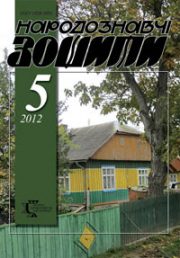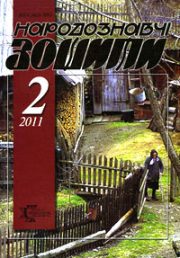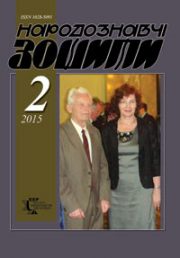The Ethnology Notebooks. 2024. № 3 (177), 679—685
UDK 82-343-3:398.5]:111.11(043.3)
DOI https://doi.org/10.15407/nz2024.03.679
MYTH AND MYTHMAKING IN THE SCIENTIFIC VISION OF BERNARD LE BOVIER DE FONTENELLE
NAUMOVSKA Olesia
- ORCID ID: https://orcid.org/0000-0002-9290-7843
- Doctor of Philology, Associate Professor,
- Head of the Department of Folklore Studies
- at the Educational and Scientific Institute of Philology,
- Taras Shevchenko National University of Kyiv,
- Tarasa Shevchenko Blvd., 14, Kyiv, 01601, Ukraine,
- Contacts: e-mail: o.naumovska@knu.ua
Abstract. The article highlights the scientific views on myth and oral literature in general of the seventeenth — and eighteenth-century thinker Bernard Le Beauvier de Fontenelle, who was far ahead of his time in terms of the depth of his judgment. The article focuses on B. de Fontenelle’s studies «History of Oracles» (1687) and «On the Origin of Fables» (1724), which are devoted to the comprehension of myths and the peculiarities of their creation, taking into account psychological and comparative aspects. Despite the fact that B. de Fontenelle, as a supporter of progressiveness and rationalism, defends the position of interpreting «all ancient literature» as «a heap of chimeras, dreams, and superstitions», the thinker covers a wide range of problems related to mythmaking. An extremely important merit of B. de Fontenelle in the study of mythological texts as folklore is his absolutely innovative conclusions about the peculiarities of the relationship between psychology in general and worldview; the emergence of mythological ideas, and, accordingly, motifs and plots; narrative features of the narrator and their influence on text creation; approaching the comprehension of the emergence of variability of works through the modification processes that occur with works in diachrony; reasonable considerations of the primacy of folklore creativity and the secondary nature of authorial creativity, as well as the differentiation between these cultural layers; observations on the disappearance of certain ideas, images and plots; analysis of the stages of appearance of the main characteristics of mythological characters in accordance with the development of psychological characteristics of mankind; assumptions about the conditions and features of storage and retransmission of folklore texts; as well as comparative studies in which B. de Fontenelle, on the one hand, supports the hypothesis that such works arise independently in several cultures, and on the other hand, approaches the migration theory.
The research methodology is based on the complex involvement of various methods, principles, requirements and concepts, including scientific-biographical, structural-typological and method of constructive analysis.
Keywords: Bernard Le Beauvais de Fontenelle, myth, folklore, plot, image, motif.
Received 28.05.2024
REFERENCES
- McKie, Douglas. Bernard Le Bovier De Fontenelle, F. R. S., 1657—1757. (1957). Notes and Records the Royal Society Journal of the History of Science (Vol. 12, issue 2, pp. 193—200). Retrieved from: http://doi.org/10.1098/rsnr.1957.0009.
- Feldman, Burton, Richardson, Robert D. (1972). The rise of modern mythology, 1680—1860. Bloomington: Indiana University Press.
- Fontenelle, M. de (Bernard Le Bovier), Dale, Antonius van, Aphra, Behn. (1699). The History of Oracles, and the Cheats of the Pagan Priests. London: Printed by W. O. for Sam.
- Fontenelle, В. (1972). Of the Origin of Fables. The rise of modern mythology, 1680—1860. Bloomington: Indiana University Press.
- Voltaire. To M. De Fontenelle. Villars (1720, sept. 1). The Works of Voltaire, A Contemporary Version. The Dramatic Works (Vol. X, part 1). New York: E.R. DuMont, 1901. Retrieved from: https://oll-resources.s3.us-east-2.amazonaws.com/oll3/store/titles/2240/Voltaire_0060-10_Bk.pdf.






